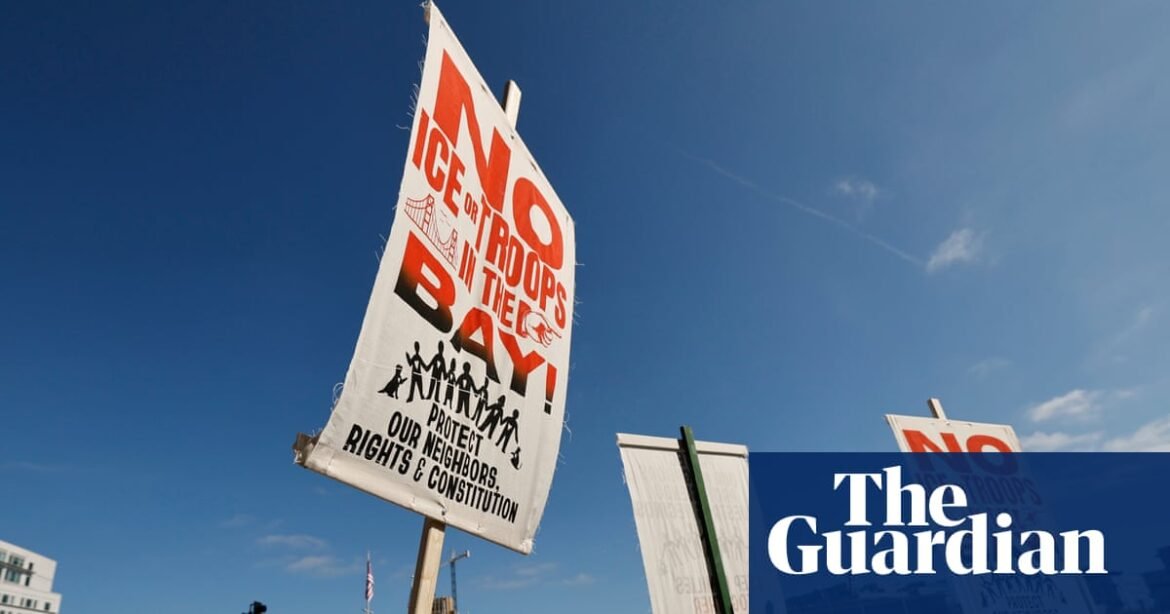Silicon Valley executives apparently leaned on Donald Trump to call off a “surge” of federal troops in San Francisco on Thursday. The president said in a social media post that “friends of mine who live in the area called last night to ask me not to go forward with the surge”. He specifically mentioned Nvidia CEO Jensen Huang and Salesforce CEO Marc Benioff.
“The people of San Francisco have come together on fighting Crime, especially since we began to take charge of that very nasty subject,” Trump wrote on Truth Socialthe social media network he owns. “Great people like Jensen Huang, Marc Benioff, and others have called saying that the future of San Francisco is great. They want to give it a ‘shot.’ Therefore, we will not surge San Francisco on Saturday.”
The move comes as tech leaders have increasingly enjoyed a cozy relationship with the president: frequently meeting with him at the White House, agreeing to pay millions of dollars to settle lawsuits and being selected for lucrative government contracts. The alliance has even brought millions of dollars to help fund the construction of Trump’s $300m ballroom at the White House with Apple, Amazon, Meta, Microsoft, Google and Palantir all chipping in.
The sway tech leaders now have over government policy is far more vast than any previous administration, including Trump’s first term. The president appears to listen to their advice, even when it comes to matters wholly outside of the tech realm, such as deploying the national guard to US cities.
“President Trump’s back-and-forth over sending troops to San Francisco shows just how much power a handful of tech executives have to influence decisions that affect millions of Americans,” said Alix Fraser, the vice-president of advocacy at Issue One, a nonprofit that seeks to reduce the influence of money in politics. “No one elected these CEOs, but their money and access have given them an outsized voice in Washington – and everyday people are left out of the conversation.”
Trump has repeatedly floated the idea of deploying federal troops to San Francisco, but the plan seemed to have accelerated last week after Benioff told the New York Times that he supported Trump and backed him sending national guard soldiers to the city. “We don’t have enough cops, so if they can be cops, I’m all for it,” Benioff told the paper.
Benioff’s comments drew intense blowback from city leaders. The Salesforce CEO had been seen as more of a progressive tech leader, supporting causes that addressed homelessness and LGBTQ+ initiatives. He’s also donated millions to local hospitals and schools. In the aftermath of Benioff’s comments, tech leader Ron Conway said he was stepping down from the board of Salesforce’s philanthropic branch and dozens of Salesforce employees signed a petition urging the CEO to “retract your endorsement” of sending troops to San Francisco. Gavin Newsom, California’s governor, told the New York Times that Benioff was a longtime friend and like “family” but that he still bristled at the CEO’s comments.
The day after Conway stepped down, Benioff apologized and walked back his endorsement of the troop deployment. By that point, however, other tech leaders, including Elon Musk and Trump’s AI czar David Sacks, had already jumped in on social media urging the government to send in the troops. Musk called downtown San Francisco a “drug zombie apocalypse” and said federal intervention was the “only solution at this point”.
On Monday, Trump announced the surge, saying more than 100 Customs and Border Protection and other federal agents were being sent to the Bay Area for a large-scale immigration enforcement plan.
As San Francisco braced for the federal troops to sweep through city streets on Thursday, Trump made his surprise announcement that he was calling it off. During a press conference, the president said he had “four or five calls” with people from San Francisco.
“We were gonna do a big surge in San Francisco, but I got a great call from some incredible people, some friends of mine, very successful people,” Trump said. “They said ‘we’re working really really hard with the mayor and we’re making progress, would it be possible for you to hold off the surge’… They have great competence, those people. Incredible competence. Some of the smartest business leaders.”
Fraser, from Issue One, said when national policy is decided by phone calls between the president and business leaders, it can be problematic for democracy. “When political leaders take cues from wealthy executives and special interests rather than the public, it deepens the sense that government works for the powerful, not for the people,” he said.
Nvidia and Salesforce did not return request for comment.

